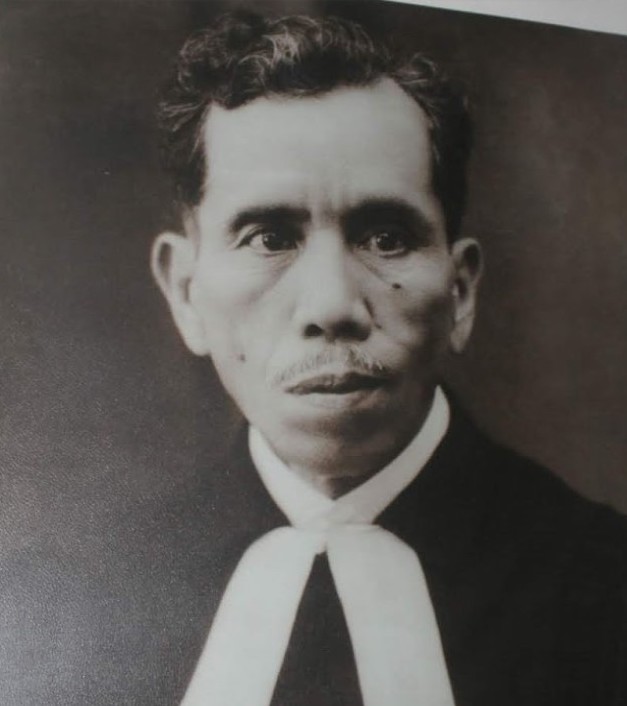

Ephorus Justin Sihombing, the longest serving leader of the Batak Christian Protestant Church (Huria Kristen Batak Protestan, or HKPB in Indonesian), ministered to Indonesians during the colonial era, the Japanese occupation, and post independence.
Though the Dutch colonized Indonesia, German missionaries from the Rhenish Missionary Society (sometimes abbreviates RMG or RMS) first translated the Bible into the local Batak language and brought protestantism to Indonesia in 1861. However, Dutch Reformed Church, which followed the Calvinist tradition, heavily influenced the growing protestant church. In 1931, the HKPB formed, becoming the first self-governing Christian body in Indonesia (then the Dutch East Indies). Its leadership, however, was predominantly German. Today the HKPB stands as the largest Protestant church body in Indonesia with over 4 million members.
Justin Sihombing graduated from college in 1912 and taught elementary school children for several years. He then continued his education at a German seminary in Indonesia, becoming a pastor in 1925. In 1940, local Dutch authorities detained all the Germans working for the RMG. So, the HKPB looked for indigenous leadership. Though Rev. Sihombing received a significant amount of support, Rev. K. Sirait became the first Indonesian Ephorus (an equivalent of Archbishop) to lead the HKPB. In 1942, as the Japanese occupied Indonesia, Rev. Sirait felt he could no longer continue, and the HKPB elected Rev. Sihombing as Ephorus.
During their occupation, the Japanese demanded that Indonesian citizens perform seikerei, a deep bowing ritual performed for the Emperor of Japan, toward the north. Because the Emperor was essentially a god in Japanese culture, this created theological problem for Christians. Rev. Sihombing was specifically known to refuse to practice seikerei. This probably created difficulties for him with the Japanese occupiers, but undoubtedly generated respect among fellow Indonesian lutherans.
Two days after Japan surrendered in World War II, Indonesia declared independence. A four year struggle with the Dutch ensued, with the Netherlands finally recognizing Indonesian independence in 1949. A commentary on Ephorsus Sihombing’s funeral claims, “Rev. Justin Sihombing was also one of the church figures who carried out the independence movement, where he went from church to church (congregation) announcing the independence of the Republic of Indonesia at that time, it’s just that this figure in the Indonesian Independence movement has not been well publicized.”
As the HKPB sought to join the Lutheran World Federation (created in 1947), the HKPB’s Calvinistic influence presented a problem. The LWF required that member bodies accept the Augsburg Confession. To solve this problem, Ephorus Sihombing wrote a confession specifically for the HKPB, Confessie HKBP 1951, which the LWF accepted. Thus allowing the HKPB to join the LWF in 1952.
Ephorus Sihombing stepped down in 1962, but continued writing books and devotional sermons until his death in 1979.
*Note: the author used Google Translate extensively in researching Ephorus Sihombing’s life. Several of the resources below are in Indonesian.
More about the HKPB:
https://en.wikipedia.org/wiki/Batak_Christian_Protestant_Church
https://www.jstor.org/stable/10.1163/j.ctv4cbgb1.18?seq=28
More about Justin Sihombing:
https://id.wikipedia.org/wiki/Justin_Sihombing
https://www.lintaspublik.id/2020/07/terbongkar-ternyata-pdtdrjustin.html

